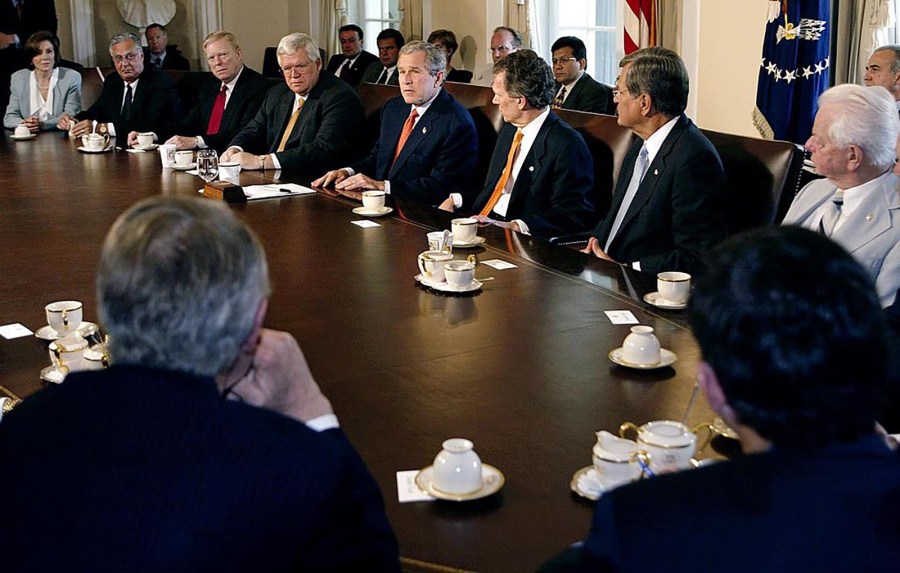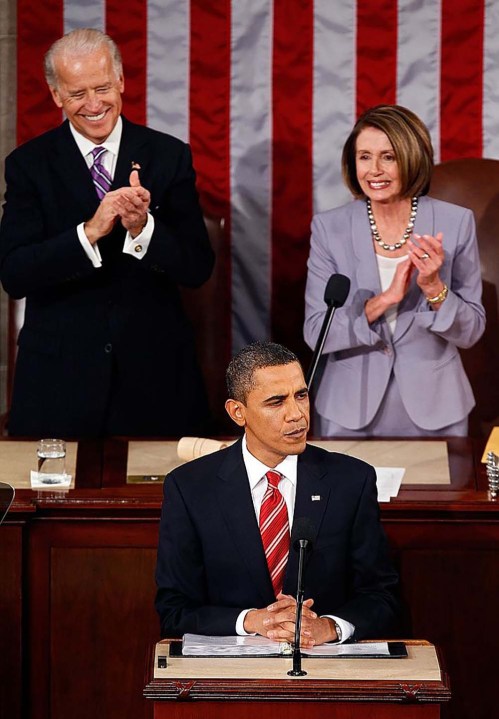End of an era: Pelosi steps down as House Democratic leader
The Nancy Pelosi era has come to an end.
After leading the Democrats for the last two decades, the House Speaker announced Thursday that she will step down next year from her spot at the top of the party, closing a momentous run for the most powerful woman in U.S. history while clearing the way for a younger generation of up-and-coming lawmakers to climb into the leadership ranks.
The announcement, which came shortly after late midterm results had officially flipped House control to the Republicans, sent shockwaves across Capitol Hill, as lawmakers in both parties grappled with the thought of a Democratic House without Pelosi at the helm.
Yet the departure is only partial: Pelosi will cede her formal leadership seat, but remain in Congress indefinitely, where she’s aiming to assume a mentorship role and grease the transition for whichever new leader fills the mantle. Such a role would be unprecedented in modern memory — most leaders who step down quickly leave Congress — but Pelosi is not one to do things by the book.
The House chamber during Pelosi’s speech was a study of partisan contrasts. While her Democratic allies packed into their side of the chamber, filling almost every seat, the Republican side of the chamber was virtually empty — a sign of just how polarized Congress has become in recent years.
Only a handful of GOP lawmakers were on hand for the speech, including Reps. Joe Wilson (S.C.), Tim Burchett (Tenn.), Doug LaMalfa (Calif.) and Young Kim (Calif.). But a vast majority of Republicans skipped the event, including House Minority Leader Kevin McCarthy (Calif.). Only one member of the GOP leadership team was on hand: Rep. Steve Scalise (La), the Republican whip, who gave Pelosi a standing ovation at the end.
Burchett and LaMalfa later hugged Pelosi.
Her announcement ends the perennial speculation game surrounding the future of Capitol Hill’s single most powerful lawmaker, and she kept them guessing to the very last.
After Democrats had staved off a red wave in this year’s elections, there was plenty of talk that Pelosi could remain in power, if she chose, even despite a previous pledge to step out of leadership at the end of this term.
In the end, Pelosi suggested her decision to exit hinged more on the recent assault on her husband, Paul Pelosi, who was bludgeoned with a hammer last month at the family’s San Francisco home by an intruder whose intended target, police said, was the Speaker.
By remaining in Congress outside of leadership, Pelosi can remain influential as an adviser, fundraiser and vote-getting whip while taking a foot off the gas of her famously frenetic schedule — a hybrid role that will allow her to spend more time with her recuperating husband.
On Capitol Hill, the change will be seismic.
Pelosi has led the House Democrats since 2003, marking the longest leadership run in either party since the legendary tenure of Sam Rayburn, a Texas Democrat, who died in office in 1961. Over those 20 years, she oversaw passage of some of the most significant legislative accomplishments of the last half-century; raised more than $1.2 billion for the party; and shattered the glass ceiling in 2007, when she became the first woman ever to ascend to the House Speakership — a feat she repeated in 2019.
“She’s a tough, effective, focused, disciplined woman. I wasn’t always on the same side as her — and it’s not pleasant being on the other side of her — but she knew how to bring a disparate group of people together to get the job done,” Rep. Debbie Dingell (D-Mich.), a close Pelosi ally, said Thursday morning as Democrats waited anxiously for the Speaker’s announcement.
“For women, the doors have been opened wider for all of us because of what she did.”
Along the way, Pelosi helped steer the congressional response to the Great Recession; guided the passage of ObamaCare; secured trillions of dollars in emergency relief through the COVID-19 pandemic; and made the decision to impeach former President Trump, not once but twice.
Pelosi also launched the special investigation into the Jan. 6, 2021, attack on the Capitol, the results of which could reverberate through the legal and political world for many years to come.
“I’m not a House historian, but what I hear from House historians is [she’s] probably the strongest Speaker of the House we have seen in many, many, many years,” said Rep. Rosa DeLauro (D-Conn.), another close Pelosi ally.
“It’s values, her strategic ability, her knowledge of the system, how to negotiate — all of those really melded into one person, which have forged an unbelievable legislative legacy,” she continued. “And that’s wherein lies her strength. … Someone who knows how to get from A to B, with a very diverse caucus.”
Part of that legacy will be this year’s midterm elections. Heading into the polls last week, Republicans were expecting a rout, one that would lend them a considerable majority to do battle with President Biden through the last two years of his first term. Instead, Democrats were able to cling to dozens of toss-up seats in battleground districts, limiting the Republican gains and making it harder for GOP leaders to govern next year.
“This really solidifies her legacy as the most accomplished Speaker in U.S. history, by all measures — all measures,” Ashley Etienne, Pelosi’s former communications director, said of Pelosi’s role in the Democrats’ midterm performance. “There’s no question.”
Pelosi’s decision will clear the bottleneck that’s existed at the very top of the Democratic Caucus since 2003, when she and her top deputy, Rep. Steny Hoyer (D-Md.), assumed the leading spots. Rep. James Clyburn (D-S.C.) would join them in 2006 in the No. 3 slot, where he has remained ever since.
Neither Hoyer nor Clyburn have ruled out bids to remain in power in the next Congress. But a younger group of up-and-coming Democrats is eager to climb the leadership ladder, or just get into the ranks.
Three current members of leadership — Reps. Hakeem Jeffries (N.Y.), Katherine Clark (Mass.) and Pete Aguilar (Calif.) — are expected to launch bids for higher spots at the first opportunity.
Jeffries, a member of the Congressional Black Caucus, is widely viewed as the favorite to replace Pelosi. And Rep. Joyce Beatty (D-Ohio), who heads the Black Caucus, predicted Thursday that every member of that group would back Jeffries.
But Hoyer, after almost 20 years right behind Pelosi, has raised tens of millions of dollars for the party over the years, building his own loyal following along the way.
Updated at 1:02 p.m.
Copyright 2025 Nexstar Media, Inc. All rights reserved. This material may not be published, broadcast, rewritten, or redistributed. regular





















